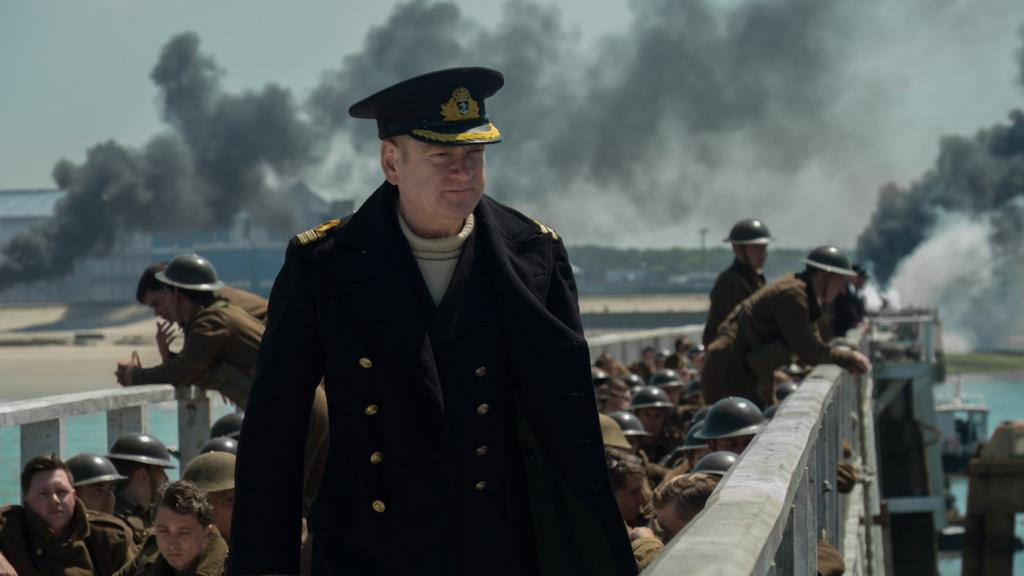Dunkirk: A Different Day at the Beach

In Dunkirk, director Christopher Nolan tells the story of the 1940 British evacuation from France at the outset of World War II. The film, which cleverly plays with converging timelines, focuses on a soldier on the beach (played by Fionn Whitehead), the harried naval officer directing the seemingly hopeless evacuation (Kenneth Branagh), the civilian called to sail his small yacht across the Channel to pick up soldiers (Mark Rylance), and a Spitfire pilot desperately flying to protect the ships from aerial attack (Tom Hardy).
Dunkirk doesn’t shy away from the horror of war. More to the point, Dunkirk doesn’t let you shy away from the horror of war. You cannot ignore the constant strain and pressure war puts upon human beings and the terror that violence induces in its victims – nor should you. Nolan makes you look at the evil human beings will do to each other and doesn’t permit you to turn your eyes to anything else for the entirety of the film.
Dunkirk depicts with considerable historical accuracy one of the most dramatic moments of World War II: as German forces rapidly advance into France, the outgunned British Expeditionary Force of 400,000 soldiers beat a hasty retreat to the beaches of Dunkirk, roughly 50 miles from the English coast. With disaster looming, the British faced the almost impossible task of evacuating their army before the Germans overran the defenses on the beach. With the help of a massive flotilla of civilian ships and boats, the British managed to evacuate the bulk of their army before the Germans seized control of the beaches.
***
 In a tightly-paced 90 minute film, Nolan manages to do justice to most elements of the Dunkirk evacuation, including the disorganized British retreat to Dunkirk, the relentless German air attacks on the beach and in the English Channel, the numbing despair of soldiers waiting on the beach for evacuation but not expecting it, and the unexpected arrival of a motley civilian fleet of yachts, fishing boats, and barges that evacuated the remaining troops. Most remarkably, the film maintains considerable dramatic tension in a movie that depicts a relatively well-known historic event.
In a tightly-paced 90 minute film, Nolan manages to do justice to most elements of the Dunkirk evacuation, including the disorganized British retreat to Dunkirk, the relentless German air attacks on the beach and in the English Channel, the numbing despair of soldiers waiting on the beach for evacuation but not expecting it, and the unexpected arrival of a motley civilian fleet of yachts, fishing boats, and barges that evacuated the remaining troops. Most remarkably, the film maintains considerable dramatic tension in a movie that depicts a relatively well-known historic event.
That description makes the film seem like a standard movie from its genre. I assure you that it is not. Reviews that critique Dunkirk as if it were simply a paean to a heroic event of great significance or an empty and grey war spectacle miss the point: Dunkirk is neither a sentimental war story nor a bloody festival of guts and gore. There is very little sentiment in Dunkirk and even less blood, though there are the requisite deaths and explosions.
Christopher Nolan is aiming at something different than the usual war film. Nolan discards all the typical tropes. There is no band of easily-recognized ethnic stereotypes talking about life in the old neighborhood or schooldays before the war, or wistful images of a sweetheart back home for whom our plucky warrior pines. The dialogue is sparse, and the few bits of humor are grim and laconic. Hans Zimmer’s score is terse and minimal, serving to amplify the metallic sounds of war; the rare moments of rousing anthem are harshly undercut by subsequent moments of sheer terror and chaos. This is a film that drops a moment of levity simply to make the subsequent sound of incoming German dive-bombers even more disheartening.
The minimal character development that Nolan employs throughout Dunkirk points to Nolan’s larger focus: this movie is only minimally about any of the individuals involved in the evacuation. Rather, Dunkirk is about the nation itself, grappling with the ongoing and ever present possibility of total defeat and destruction. Nolan walks you past soldiers who see death circling ever closer, and their countrymen’s frenzied (and miraculously successful) attempts to avert it. And even though you know that most soldiers will be successfully evacuated, you still don’t believe it will happen until you see soldiers walking through an English train station.
Most surprisingly, Dunkirk is a strikingly spiritual film. Though there is little overt religiosity in the film, it is a film that demands prayerful reflection. Through Dunkirk, we can look at the part of the world that still waits eagerly for the dawning of a new heaven and a new earth, the part of the world that cries out still for the fullness of redemption and new life. The drama of human dysfunction is fully on display in Dunkirk, as the strain of war and violence wreaks havoc on the humanity of the evacuating soldiers and the sailors who convey them.
***
The actual events of Dunkirk are nearly 80 years in the past. Yet, watching ships sink in the surf while men and women struggle to survive for just another moment is hardly irrelevant. Obliquely, Dunkirk harkens to the ongoing crisis of migrants and refugees. Everyday we read reports of ships more ramshackle than the wooden yachts of the English Channel foundering in the Mediterranean and the deaths of far too many men, women, and children, who like the men and women of Dunkirk, sought refuge and safety. We ought not avert eyes to them, either.
Go see Dunkirk. Do not look away from the history that Christopher Nolan is showing you. Peer deeply at the world of the past in its ugliness and beauty and let it inspire to keep your eyes open to the present world, too. Let an ethic of open eyes be the first step of many towards a growing solidarity and fraternity with all those standing upon anxious beaches desperately waiting for the chance to reach safe home.
***
Reposted with permission from The Jesuit Post.
Images courtesy FlickrCC users Craig Duffy and deepskyobject.




peeps
Posted at 14:52h, 30 JulyWOԜ just what I was looking for. Came hеre by searching fⲟr subtlety